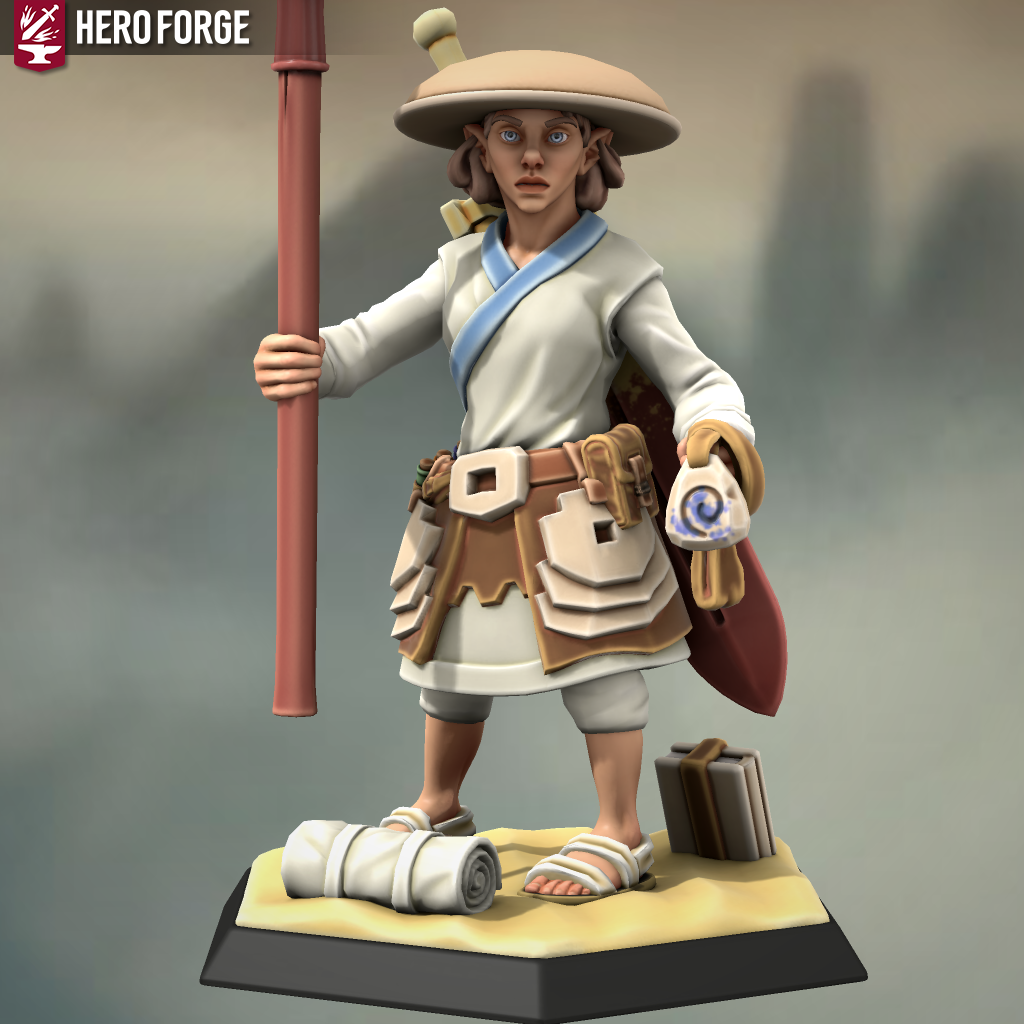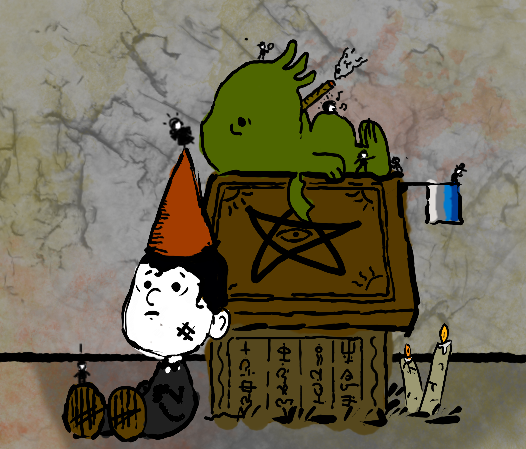Hierophant
A Heirophant is a a religious leader within Rostran Esotericism and all sects which depend from that faith (such as Knappism and Ixa Ad-Korvidiu). A Heirophant, as the name implies, is a professional holder of Esotericist mysteries who uses their knowledge to propitiate the spirits on the behalf of their people and educate the laity on the doctrines of the faith. More specifically, 'Heirphant' is a title accorded to the most devoted and knowledgeable of scholars in the Esotericist faith, a position which requires a long-term apprenticeship under the current Heirophant of one's polity and a demonstrated knowledge of the deeper mysteries associated with the faith; lesser scholars may be called 'practitioners' or even 'teachers,' but there is only one Hierophant for a given village or region.
Qualifications
Prospective Heirophants are drawn from the most religiously devout and knowledgeable members of the region in which they serve. They must demonstrate a chapter-and-verse knowledge of the Ixaba - the living canon of Rostran Esotericist religious doctrine - and must journal their own practices (i.e. the construction of 'good' or 'binding' ritual sigils) to demonstrate this knowledge to the Heirophant under which they will apprentice. Heirophants may be of either gender, so long as they demonstrate the appropriate level of knowledge; a narrow majority of Hierophants are male as of the year 10,000 AR, but this is a result of chance rather than design.
Appointment
While there is no set time at which this occurs, when the current Hierophant of a given polity either dies or approaches a point in their life at which they can no longer effectively perform their religious duties, a new Hierophant is chosen from among the current Hierophant's apprentices. This requires the Hierophant to maintain a up-to-date accounting of which apprentice or apprentices they see as the most worthy of the title, as none know the hour of their own death or incapacity. Should a Hierophant die with no appointed heir to the title, then the Hierophant of the next most encompassing polity (i.e. for an entire island chain of which a Hierophant's village is just one part) will make the decision on their behalf. Should more than one Hierophant be listed as such, then the two will either come to an agreement on the matter or, sometimes, the one with a more long-lasting apprenticeship will be chosen.
'High' Hierophants are in charge of regional - as opposed to local - matters of faith, including appointments to the position of Hierophant. High Hierophants are 'elevated' to such a position via a similar process whereby 'lower' Hierophants are apprenticed to the High Hierophant. Such High Hierophant positions are not universal throughout the organization, typically coming about as a result of the external-to-the-faith merger of several smaller polities into a larger one (as was the case with city-states like Exivaun or Eudoxia).
Duties
A Hierophant:
- promugates the knowledge of the faith to all the faithful within his or her polity.
- performs private, civic, and public rituals on the behalf of his or her polity,
- conducts scholarship and research in the interest of preserving and expanding the faith,
- intervenes with the spirits on the behalf of the people which they serve, and
- contribute to the maintenance and development of the Ixaba in conjunction with all other Hierophants across The Rostran Arc.
Benefits
Because Hierophants are important fixtures of High, Low, and Cobalt Rostran religious life, Hierophants enjoy a great deal social cachet wherever they are stationed. When the Hierophant speaks, the faithful listen, as the Hierophant has the ears of the spirits and the knowledge of deep mysticisms with the power to bless - or doom - the whole village. The Hierophants themselves typically enjoy a polity-sponsored home for themselves and their immediate family, with wealthy settlements also funding 'academies' where apprentices are also kept in comfortable (if spartan) accomodations during the course of their education.
Accoutrements & Equipment
A Hierophant is seldom found without a large pouch containing ritual offerings (such as incense and herbs), a firestarter, candles, and colorful powders or chalks with which to inscribe ritual sigils. Hierphants carry a copy of the Ixaba and notebook bound in ornate island hardwoods carved with warding sigils, the latter book being used to account for their own ritual practices in real time. Most Hierophants also carry a fighting oar as a walking stick and dress in cloaks featuring woven patterns in the style of the local culture, such as woven palm lattice print among the High Rostran mountain villages or slate-blue geometric tesselations among the New Cobalt Protectorate clanholds. Hierophants expecting to enscribe certain ritual sigils may prepare ritual foods ahead of time as more specific offerings to the spirit to be contacted (i.e. a deceased relative's favorite types of confections or bait for a certain type of powerful sea creature).
Oar-markers are conditional accoutrements for Hierophants, as they are generally only carried when sigils are planned to be inscribed in the names of Ixutabmut or Ixaumosana (i.e. in the case of funerary rites). Hierophants are familiar with the appropriate placement of markers, though they may engage outside contractors to create them. However, Knappist Hierophants - sometimes known as Forgemasters - are obliged by their connection to the Knapper of Spirits to create their own oar-markers and the tools to make them.
The Hierophant's apprentice(s) count as extensions of the Hierophant themself for the purpose of performing particularly wide-spanning rituals (i.e. the etching of sigils to protect coastlines against Ixulova Tun) and are thusly considered as part of a Hierophant's ritual implements.
Grounds for Removal/Dismissal
Other than the usual succession proceedures at death or infirmity, a Hierophant may also be removed for gross incompetence, negligence, or impeity. The ultimate authority of a Hierophant derives from the belief in their efficaciousness on the part of the people they serve. Over the centuries, numerous Hierophants have been forced to chose a successor after spectacularly hubristic rites which claimed to have the power to prevent disaster - only for a worse disaster to come along and prove the Hierophant's sigils lacking.
Type
Religious, Clerical
Equates to
A Hierophant for a given village might be considered the equivalent of a Servant of Ironies in the Church of the Unexpected with regards to their religious duties and their connections to a local congregation. This parallel extends to the presence of 'generalist' and 'specialist' Heirophants, with generalists often finding employment as leaders among other Hierophants and cultural advisors within the governments of Rostran nation-states (such as the Rostran Archipelago Confederacy). The power structure the Esotericist organized religion is more vertical than that of Forgism or the Way of the Biocosm, but more flat than that of the Church of the Unexpected.
Length of Term
Lifetime
Related Locations
Related Organizations







I like the section about appointment, and that you've thought about what would happen if a heirophant dies without a chosen heir. Really interesting. I also love the section about their accoutrements - I felt like it was vivid and colourful. :)